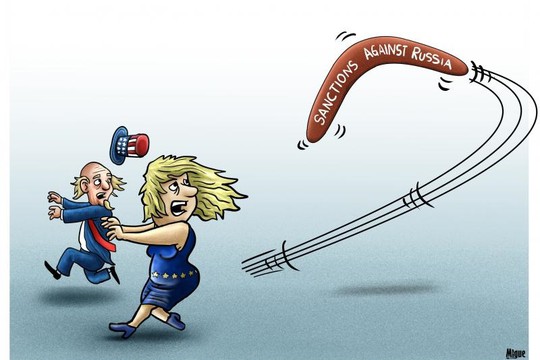The Ukrainian conflict gave a start of an economic war waged against Russia by the West, but its outcome is far more uncertain, notes “Counterpunch”.
The US, UK, EU and their allies have sought to impose a tight economic siege on Russia, focusing primarily on its oil and gas exports, to weaken it and compel it to give up its assault on Ukraine. But it has not been going well and the West suffered a serious setback this week when the OPEC+ group, which includes Russia, decided to cut its crude exports by two million barrels a day in order to force up prices.
British prime-minister Truss asked Biden for two things: a strong effort to bring down world energy prices and a total embargo on Russian oil exports. Biden was surprised that Truss did not understand that her requests contradicted each other. Taking Russian crude off the market would inevitably raise the price of oil. After the meeting, Biden told his aides that he found the new British prime minister to be “really dumb”, and not to be taken seriously.
The purpose of sanctions is to deny the Russian state the revenues needed to fight the war in Ukraine and in this it has completely failed.
Russia’s economy ministry, as reported by Reuters citing government documents, says that expected Russian energy export revenues will reach $338bn in 2022 which is nearly $100bn or a third more than the $244bn figure for last year. The rise in export earnings will be even higher after the OPEC+ production cut. The ministry had expected the Russian economy to contract by as much as 12 per cent, but has revised this down to 4.5 per cent.
If the damage inflicted by sanctions on the regime in Moscow is less than expected, the self-harm to the rest of Europe and to a lesser degree the US, has been far greater. Every country faces a cost of living crisis. Manufacturing industry is buckling, particularly sectors producing metals, fertiliser, paper, glass and anything requiring a high input of gas and electricity. The National Grid in Britain warned this week of the risk of electricity blackouts.
Liz Truss and her ministers keep saying that the worldwide cost of living crisis is the result of “Putin’s illegal war in Ukraine”. But it would be truer to say that the economic turmoil is the result of an ill-considered decision to wage economic warfare against Russia which was never likely to work.
The Hungarian Prime Minister Viktor Orbán said this summer that “initially, I thought we [the Europeans] had only shot ourselves in the foot, but now it is clear that the European economy has shot itself in the lungs, and it is gasping for air”.
Yet an embargo on Russia was always a dubious policy. Sanctions on much smaller countries like Iran, Iraq and Syria have failed to change regimes or behaviour. They had never been tried against a country with a surplus of oil and gas and capable of feeding itself, like Russia.
US-backed plan is for a price cap to be put on Russian oil so it would continue to flow, but at a much reduced profit to the Kremlin. A drawback in this piece of wishful thinking is that it would require Russian co-operation – and the Russians say they will cease to supply anybody trying to implement such a scheme, emphasizes “Counterpunch”.
read more in our Telegram-channel https://t.me/The_International_Affairs

 10:52 12.10.2022 •
10:52 12.10.2022 •























